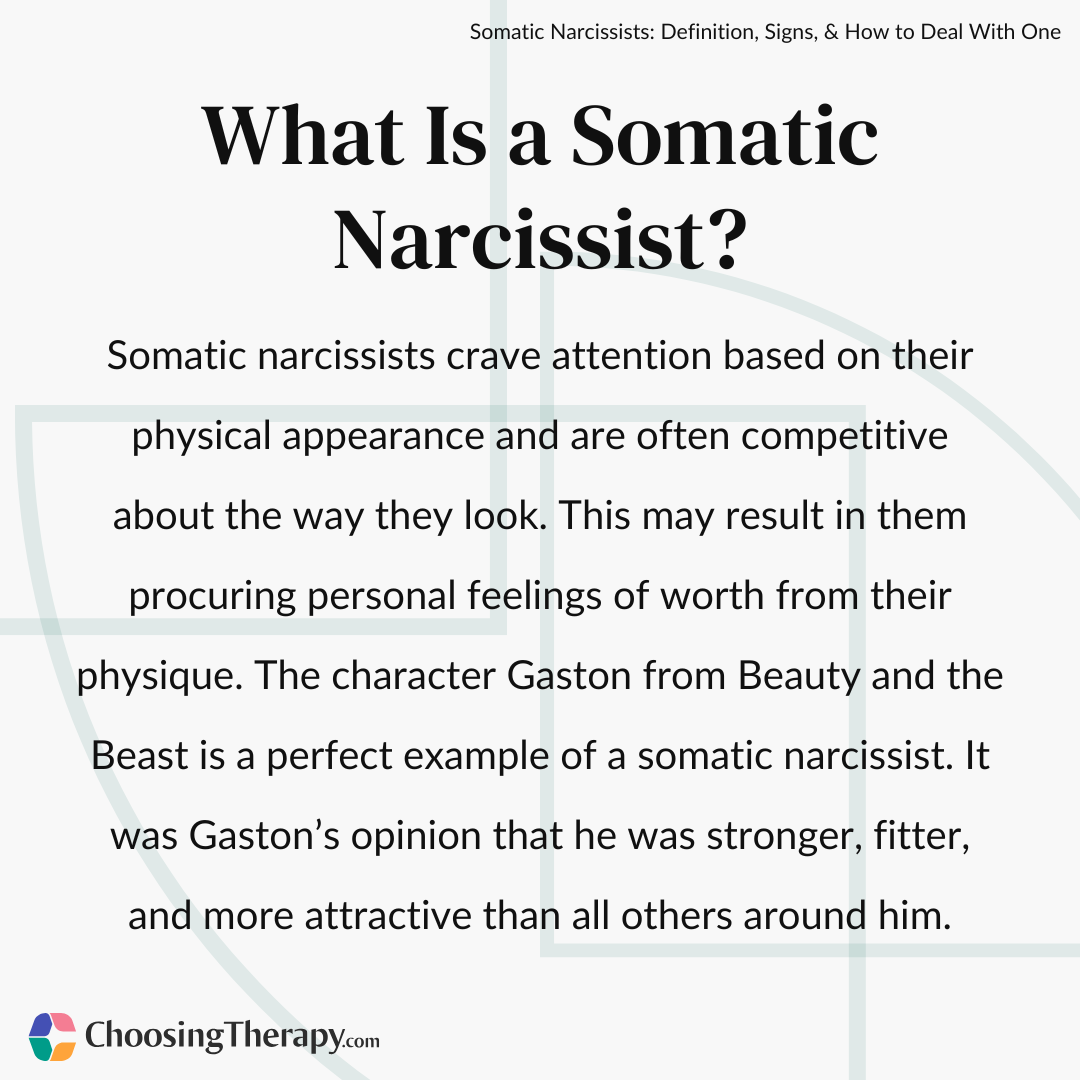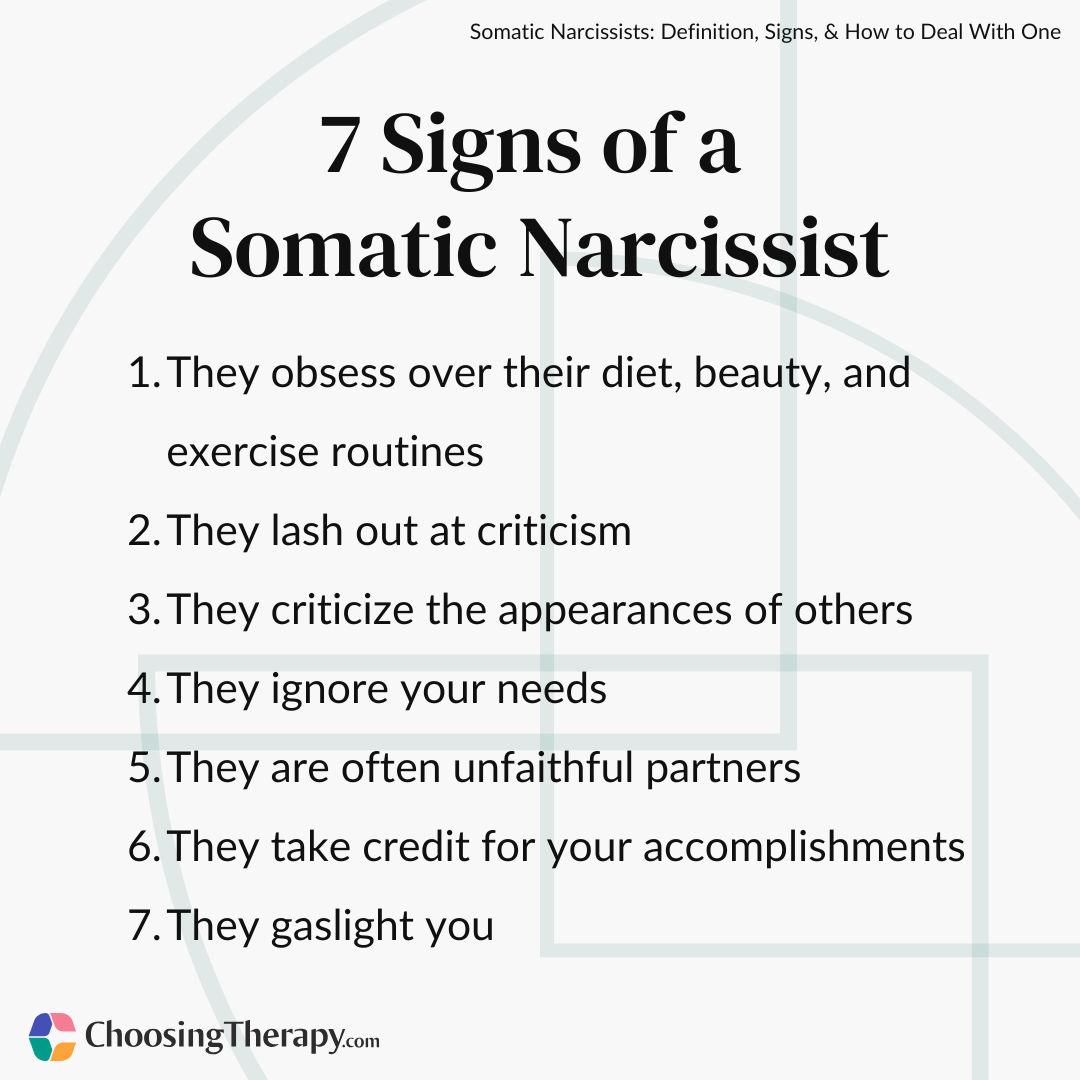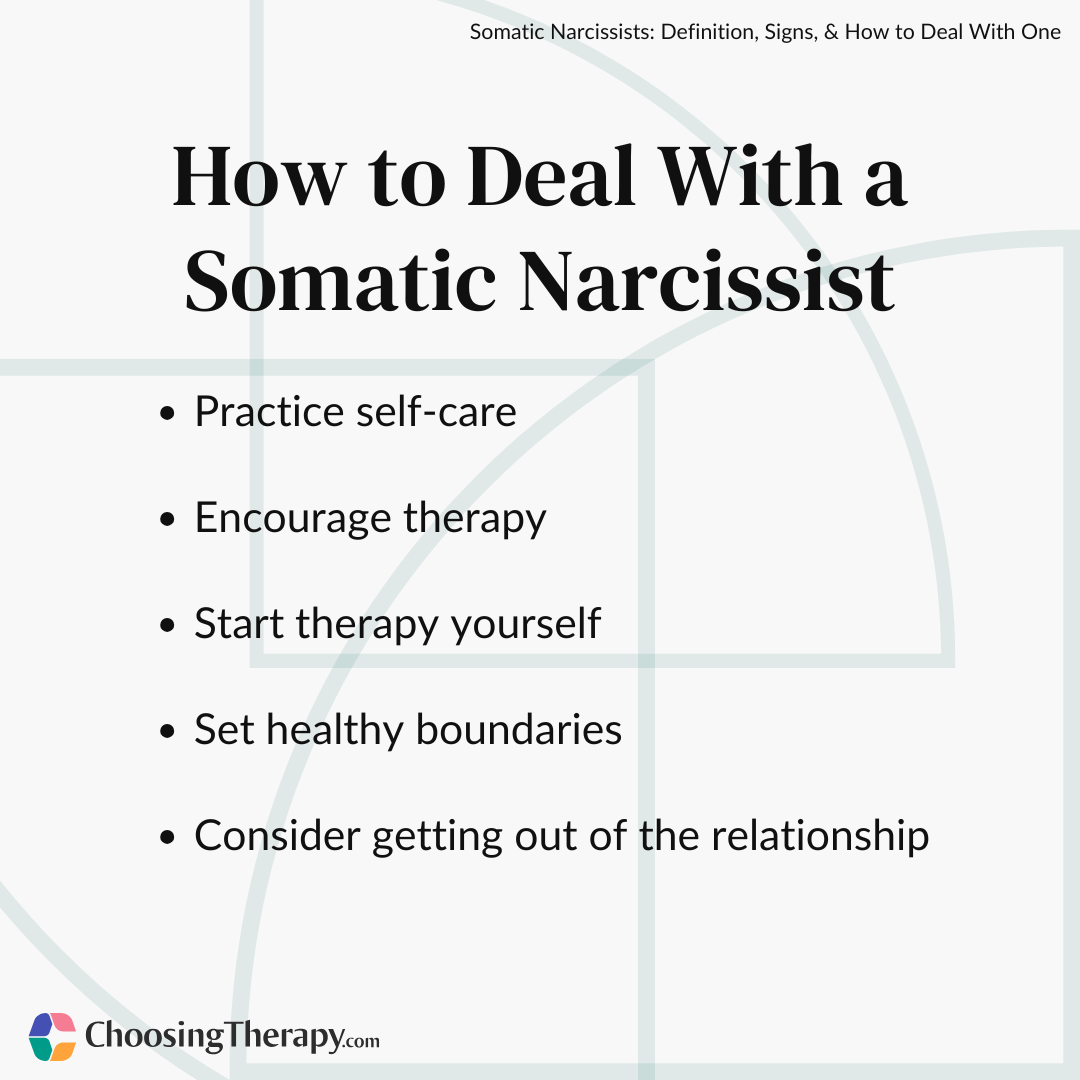A person diagnosed with Narcissistic Personality Disorder possesses an unreasonably high sense of self and their own importance.1 The word “somatic” means “related to the body,” and a somatic narcissist is someone who is preoccupied with their physical appearance and derives much of their self-worth from external validation.
Would you like help recovering from a relationship with a narcissist?
BetterHelp has over 20,000 licensed therapists who provide convenient and affordable online therapy. BetterHelp starts at $65 per week. Take a Free Online Assessment and get matched with the right therapist for you.
What Is a Somatic Narcissist?
Somatic narcissists crave attention based on their physical appearance and are often competitive about the way they look. This may result in them procuring personal feelings of worth from their physique. The character Gaston from Beauty and the Beast is a perfect example of a somatic narcissist. It was Gaston’s opinion that he was stronger, fitter, and more attractive than all others around him.
In clinical terms, Narcissistic Personality Disorder (NPD) is a personality disorder; although there are no formal types of NPD, various patterns of behavior present in people with certain narcissistic traits. Often with this disorder, character traits can appear from all of these categories. For example, a somatic narcissist may also present as a vulnerable narcissist, if it fits his or her needs. Or, they may more closely resemble a grandiose narcissist, with a major red flag being that they are solely focused on their own successes.
Some traits of a somatic narcissist include:
- Obsession over food and weight
- Obsession with physical appearance and working out
- Obsessive need for admiration
- Lack of empathy
- Hyper-focused on clothing and the latest styles
- Fixation on makeup, “treatments,” and even plastic surgery
- Use of sex to get their own needs met, without awareness of their partner’s feelings
Somatic Narcissists vs. Sexual Narcissists
Somatic narcissists and sexual narcissists can present similarly. However, the primary difference is that sexual narcissists have an inflated sense of their own sex appeal and sexual skills.2 These traits may also be present in a somatic narcissist, but their narcissism doesn’t exclusively revolve around their sexual behavior. Somatic narcissists may use sex as a way to heighten their ego, but they don’t use it in their favor against others, like a sexual narcissist does.
A sexual narcissist will frequently demonstrate behaviors such as sexual exploitation, a lack of sexual empathy, sexual entitlement, and an exaggerated sense of sexual skills.2 All narcissists tend to target those who are vulnerable in order to meet their own needs. The act of doing so is often referred to as their narcissistic supply. Somatic narcissists feed off of compliments about their body and the way they look, whereas sexual narcissists get their supply from egocentric sexual encounters. Regardless, sexual encounters with narcissists can often be very one-sided.
Somatic Narcissists vs. Cerebral Narcissists
As discussed earlier, the word somatic relates to the body. Therefore, somatic narcissists are obsessed with their physical appearance and weight, often securing self-worth from their body image. On the other hand, cerebral narcissists gain their sense of value from their intellect. They believe that they are smarter than everyone around them, and will make every effort to win arguments or put people in their place by using big words or talking about their Ivy League education. Cerebral narcissists fulfill their supply by being the smartest person in the room, and they don’t care if feelings get hurt along the way. However, a somatic narcissist will try to impress you with their six-pack abs, not their brains.
Are you dating or married to a narcissist?
Whether you’re trying to move on or rebuild a relationship, a licensed therapist can guide you. BetterHelp has over 20,000 licensed therapists who provide convenient and affordable online therapy. Visit BetterHelp
Is your mother, father, or family member a narcissist?
Being raised by a narcissist can damage your confidence and self-esteem. A therapist from Online-Therapy can help you both heal from the past, and manage the relationship to be less harmful. Counseling starts at $50 per week. Try Online-Therapy
5 Signs of a Somatic Narcissist
A narcissist is typically defined as a person with an inflated sense of self-worth who behaves in a self-centered manner. With somatic narcissists, this personal conceited ideation revolves primarily around physical appearance.
Here are five signs of a somatic narcissist:
1. They Obsess Over Their Diet, Beauty, & Exercise Routines
Somatic narcissists are focused on their own appearance and will do whatever it takes to make sure that they look impressive. This may include plastic surgery, injections, and spending obscene amounts of money on makeup, clothing, and fitness related items. They hold their “healthy” lifestyle over others by keeping conversations focused on themselves and how great they look and feel. Often an inflated sense-of-self can mask an underlying insecurity or lack of self-confidence. The constant need of a somatic narcissist to fix or alter their body may be related to issues with body image, body dysmorphia, or muscle dysmorphia.
2. They Lash Out at Criticism
In general, narcissists struggle with accepting criticism, even when given in a constructive manner. They often lash out in a defensive or hurtful manner as a way to wound the other person. This is known as a narcissistic injury and can result in the narcissist feeling viciously targeted, even if the critique was minor. They often react with extreme rage and seek out revenge on the other person. For somatic narcissists, this occurs when they receive a critique related to their body or appearance, which is then perceived as a personal attack.
3. They Criticize the Appearances of Others
Somatic narcissists will often put down others who they believe are physically inferior to them. They do this by making jokes about a person’s weight, physical characteristics that they consider flaws (such as acne, scars, or birthmarks), or by laughing at how someone’s age is affecting their appearance. This type of behavior can be considered body shaming.
Somatic narcissists may also become overly consumed by other people’s appearances, and try to tell them what to wear, how to eat, and the best way to work out. This may appear to be in the interest of another person, but is actually a form of narcissistic manipulation.
4. They Ignore Your Needs
The somatic narcissist is always going to be number one in their eyes. They will prioritize their own needs and do not understand how this behavior impacts others. As a result, they struggle to relate emotionally to others because of this hyperfixation on themselves. This type of behavior may leave you with feelings of uncertainty about yourself and your relationship with this person.
5. They Are Often Unfaithful Partners
Somatic narcissists are often unfaithful partners, due to their inability to form emotional connections. The act of sex and showing off their body becomes a pursuit, as does looking for another “perfect body” to enjoy. Sex for the somatic narcissist is often a form of manipulation or a way to get their supply–to confirm that they look good and thus receive an ego boost.
How to Deal With a Somatic Narcissist
In our current appearance and fashion obsessed culture, somatic narcissists are pervasive. If you know someone whose physical appearance is monopolizing their life, it could be time to take necessary steps and learn how to approach their behavior.
Here are some ways that you can deal with a somatic narcissist:
Practice Self-Care
Your own needs are important, especially when dealing with those who have inflated egos or are prone to offering criticism. Practicing self-care is a way that you can tend to yourself physically, spiritually, and emotionally. In doing so, you may be able to challenge and overcome any negative emotions that come up when interacting with a somatic narcissist.
Encourage Therapy
Narcissism is a complex disorder that often causes problems in relationships and at school or work, as well as lead to other mental health concerns.1 As a result, it’s often very difficult to have a “healthy” relationship with a somatic narcissist. They typically don’t see a problem with their behavior and will be reluctant to seek out treatment. Therapy can be helpful if a somatic narcissist is fully invested and interested in changing. Narcissists can change if they are genuinely committed to their own personal growth and development.
Start Therapy Yourself
A relationship with a somatic narcissist is full of highs and lows, and is generally very complicated. They are often loving and sweet in the beginning–then the other shoe drops, and they become critical and demanding. If there are signs of narcissistic abuse in your relationship, it’s important to get support and find a therapist. Therapy can be done both in-person or online, but is beneficial either way. A therapist will help you recognize the red flags and patterns that came up in the relationship, and help facilitate healing.
Set Healthy Boundaries
One of the best ways to protect yourself in any relationship, but particularly with a somatic narcissist, is by setting clear boundaries. Learning how to set healthy boundaries will provide you with the tools to get started. It’s important to understand in advance what you need in a relationship, but to also be realistic in what you can expect from a somatic narcissist. Once you recognize your limits, you can then decide (either on your own or with the help of a trusted friend or therapist) if boundary violations are acceptable and if your relationship is worth saving.
Consider Getting Out of the Relationship
If your personal boundaries are repeatedly violated, it may be time to consider ending your relationship with a somatic narcissist. Some personal boundaries may include, being physically, sexually, or emotionally abused, being humiliated or talked down to, or gaslighting. Ending a relationship with a narcissist isn’t easy, but with support and guidance from loved ones or a therapist, it is possible.
Final Thoughts
In today’s society, it is normal to care about one’s appearance. However, it’s important to be cautious of those who are overly preoccupied with the way they look, the appearance of others, or who judge people based solely on appearance. Somatic narcissists tend to use their physical appearance to manipulate and control their relationships. If you find yourself struggling to deal with their behaviors, consider reaching out for professional support.
Additional Resources
To help our readers take the next step in their mental health journey, Choosing Therapy has partnered with leaders in mental health and wellness. Choosing Therapy is compensated for marketing by the companies included below.
Online Therapy
BetterHelp – Get support and guidance from a licensed therapist. BetterHelp has over 20,000 therapists who provide convenient and affordable online therapy. Complete a brief questionnaire and get matched with the right therapist for you. Get Started
Online-Therapy – Online-Therapy.com provides a weekly live video session, unlimited text messaging, and self-guided activities like journaling. Starting at $64 per week, this is one of the most affordable options for CBT therapy. Try Online-Therapy
Narcissist Recovery Support Group
Circles – Anytime, anonymous, and free. Never feel alone during life’s greatest challenges. Drop-in to live conversations and share thoughts, ask questions, or learn from others on the same journey. Join Circles Now
Narcissism Newsletter
A free newsletter from Choosing Therapy for those recovering from narcissistic abuse. Get helpful tips and the latest information. Sign Up
Choosing Therapy Directory
You can search for therapists by specialty, experience, insurance, or price, and location. Find a therapist today.








